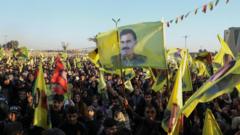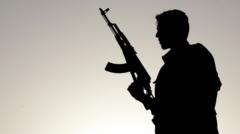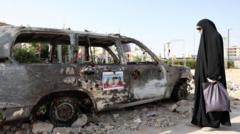As the Kurdistan Workers Party (PKK) announces its plan to disband after a four-decade-long conflict, the Turkish society remains divided between scepticism and cautious hope for lasting peace. The PKK's historical disarmament, heralded by its imprisoned leader Abdullah Ocalan, has ignited a complex dialog in Kurdish-majority regions like Diyarbakir, where sentiments about government trust and calls for amnesty are prevalent. As Turks and Kurds alike yearn for an end to violence, the path forward will likely depend on the government's responsiveness and future political dynamics.
**Cautious Optimism Amid PKK's Historic Decision to Disband**

**Cautious Optimism Amid PKK's Historic Decision to Disband**
Kurdish group PKK's disarmament raises questions about future peace in Turkey.
Amidst a sudden hailstorm in Diyarbakir, the heart of Turkey's Kurdish region, residents react to the Kurdistan Workers Party (PKK) announcing their decision to disband after 40 years of armed struggle against the Turkish state. The news marks a watershed moment in a violent conflict that has taken the lives of approximately 40,000 people and caused enormous suffering on all sides. Many locals share mixed feelings, oscillating between scepticism over governmental intentions and hope for long-awaited peace.
Directly following Abdullah Ocalan's call to surrender arms, opinions on the move vary markedly. Necmettin Bilmez, 65, expresses doubt regarding the government's integrity, indicating that real change only comes when concrete rights for Kurds, such as proper identification, are granted. Contrastingly, 80-year-old Mehmet Ek expresses wishes that such a resolution had arrived sooner, emphasizing the mutual loss felt by both Kurds and Turks throughout this "brother on brother" conflict.
In a city still showing scars from battles, many citizens voice desire for reconciliation and the cessation of further fatalities. Ibrahim Nazlican, 63, reflects on the futility of previous actions, stating that "there are no winners." The long-standing conflict has flared across Turkey, Iraq, and recent incidents have underscored the ongoing volatility.
Amid these reflections, the yearning for Ocalan’s release resonates among supporters, who view his freedom as pivotal to the Kurdish struggle. Menice, 47, who lost her son to a Turkish airstrike, emphasizes hope for a brighter future if Ocalan is liberated, expressing the collective pain within her community while mourning the lives lost to the conflict. She remains steadfastly optimistic, proclaiming, "I believe in us, in Ocalan, and our nation."
The political landscape may complicate these sentiments, as President Erdogan’s need for pro-Kurdish party support indicates potential room for negotiation. Nevertheless, the PKK has faced intense military pressure, and internal transformations in regional politics may both hinder and help this fragile negotiation process.
As both sides ponder the implications of this historic disbandment, the ambiguity of political promises leaves residents in a wait-and-see mode, hanging onto cautious hope for reconciliation and peace that transcends a legacy of violence.
Directly following Abdullah Ocalan's call to surrender arms, opinions on the move vary markedly. Necmettin Bilmez, 65, expresses doubt regarding the government's integrity, indicating that real change only comes when concrete rights for Kurds, such as proper identification, are granted. Contrastingly, 80-year-old Mehmet Ek expresses wishes that such a resolution had arrived sooner, emphasizing the mutual loss felt by both Kurds and Turks throughout this "brother on brother" conflict.
In a city still showing scars from battles, many citizens voice desire for reconciliation and the cessation of further fatalities. Ibrahim Nazlican, 63, reflects on the futility of previous actions, stating that "there are no winners." The long-standing conflict has flared across Turkey, Iraq, and recent incidents have underscored the ongoing volatility.
Amid these reflections, the yearning for Ocalan’s release resonates among supporters, who view his freedom as pivotal to the Kurdish struggle. Menice, 47, who lost her son to a Turkish airstrike, emphasizes hope for a brighter future if Ocalan is liberated, expressing the collective pain within her community while mourning the lives lost to the conflict. She remains steadfastly optimistic, proclaiming, "I believe in us, in Ocalan, and our nation."
The political landscape may complicate these sentiments, as President Erdogan’s need for pro-Kurdish party support indicates potential room for negotiation. Nevertheless, the PKK has faced intense military pressure, and internal transformations in regional politics may both hinder and help this fragile negotiation process.
As both sides ponder the implications of this historic disbandment, the ambiguity of political promises leaves residents in a wait-and-see mode, hanging onto cautious hope for reconciliation and peace that transcends a legacy of violence.






















